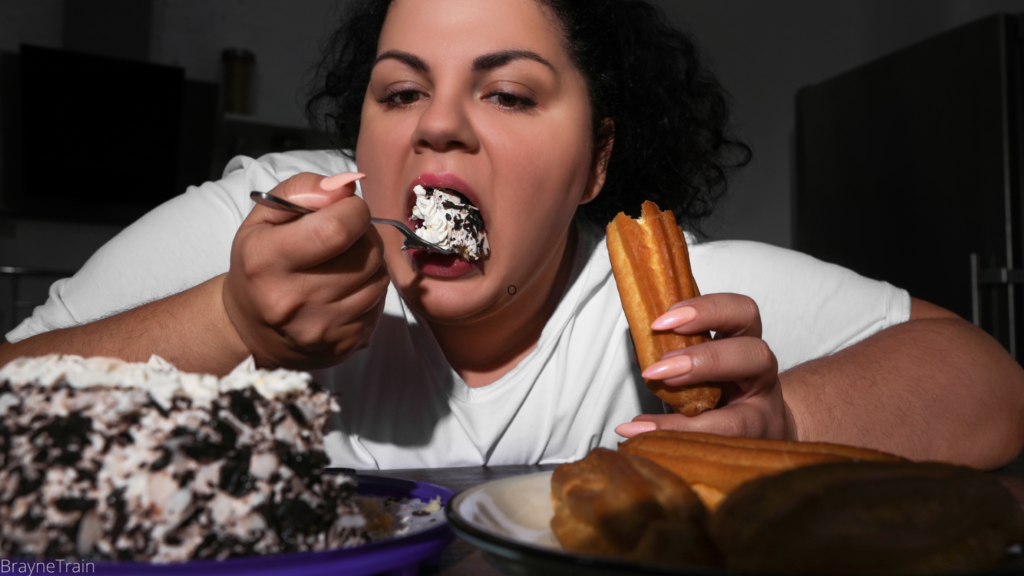
Binge Eating; how do you make the urge to binge go away?
Do you struggle with binge eating, and you want to stop?
Binge eating is a more common problem than many people realize. Binge eating does not refer to the time you overate at Thanksgiving dinner! It’s more than that.
Occasional overeating happens to the best of us.
Still, many people have developed overeating (binge eating) as a coping mechanism during stressful life events.
And many strongly believe that when the urges come, it is impossible to stop them!
However, there are ways to help stop your binge eating urges and become more mindful of your eating behavior.
Steps to help make the urge to binge eat go away:
- Accept yourself without judgment: Accept yourself and your binge eating without any judgment.
- Meditate: develop a 5-10 minutes daily meditation routine and stick to it.
- Give yourself permission: By allowing yourself to binge, you are allowing your inner child to calm down and lowering the tension that arises when the urge to binge appears.
- Mindfulness practice: Practicing mindfulness and breathwork as the urges arise will help you make better decisions in the moment. Take 1 minute to feel your inner emotions and breath. Let the feelings come up, and let yourself feel them.
- Listen to your body’s internal signals: notice your hunger level. Are you hungry? are you full? learn to tell the difference.
- Get enough sleep: lack of sleep can increase binge eating episodes.
- Eat good quality protein: Eating high-quality beef and chicken increases tyrosine levels which help improve the dopamine levels in the body. Higher dopamine (reward system) helps lower binge eating urges because you feel happier.
- Eat non-sugar sweets! Eating sweets that contain monk fruit or stevia instead of sugar can help lower the cravings for sugary food.
- Eat enough salt: Consuming enough salt helps lower cravings.
- Therapy: seek help from a therapist. Finding out the underlying cause of your binge eating behavior can help you cure your craving from inside out.
Now let’s get deeper into the definition, the psychology, and the emotions behind binge eating. The more you know about binging, the better you are equipped to stop your urges to binge, so keep on reading!

What is considered a binge eating episode?
A binge eating episode is characterized by eating a large quantity of food, often to the point that it causes stomach pain, bloating, and discomfort, in a short amount of time, usually 20-30 minutes.
Binge eating disorder involves having a binge-eating episode more than two times per week, on a weekly bases.
A binge eating episode is often followed by feelings of shame, guilt, and lack of control.
What can trigger a binge episode?
Binge eating has a strong psychological and genetic component and can be triggered by both emotional and environmental triggers.
Environmental Triggers:
- Smell: for example, the smell of your favorite food.
- Visual Cues: Seeing a donut box in the lunchroom or driving past your favorite restaurant.
- Auditory cues: Hearing someone talk about food.
- Social Cues: Eating out with friends or family and feeling the need to eat unhealthy food.
Emotional Triggers:
- Boredom or loneliness:
- Being bored or lonely can be a trigger for binge eating, because binging is often used as a coping mechanism to get you out of uncomfortable situations such as loneliness.
- Sadness:
- When you are sad or upset due to life events like a breakup or the death of a loved one, you are more likely to crave foods high in carbs and sugar.
- Anxiety or Anger.
- Anxiety, stress, or anger are likely triggers for the urge to binge because binging helps create a distraction for you. A distraction from the stress or anger you are feeling.

- Trauma
- Binge eating is a coping mechanism for many who suffer from significant trauma in their lives.
- Childhood trauma can lead to unhealthy coping skills. Emotionally unavailable parents, controlling/narcissistic moms or dads, severe emotional neglect by either parent, and or sexual abuse.
- Being body shamed as a child could lead to an eating disorder.
- Binge eating is often used to help fill an emotional void, such as an absent parent or lack of self-esteem.
- Genetics
- There appears to be a strong genetic factor for eating disorders such as binge eating.
- This means that if a mom or a dad suffered from an eating disorder or any form of addiction, the child is more likely to develop a pleasure-seeking behavior such as food addiction and binge eating.
“Negative emotions and maladaptive emotion regulation strategies play a role in the onset and maintenance of binge eating in BED. Anger and sadness, along with negative emotions related to interpersonal experiences (i.e., disappointment, being hurt, or loneliness), seem to be particularly relevant. Individuals with BED have a tendency to suppress and meditate on their unwanted emotions, which leads to increased psychopathological thoughts and symptoms.”
The Journal nutrients
Signs you have a Binge Eating Disorder:
- Weight fluctuations.
- Feelings of depression and guilt after eating.
- Being uncomfortable with eating around others.
- Hoarding food or hiding food in strange places like your room, under the bed, or your car.
- You prefer to eat alone due to embarrassment.
- You schedule your life around food.
- Constant thoughts of food.
- Extreme concern with weight and body image.

Side-Effects of Binge Eating Disorder:
- Guilt, shame.
- Depression.
- Rapid weight gain.
- Inflammation in the gut and pancreas.
- Heart disease and inreased risk of heart attack.
- Risk of developing diabetes.
- Poor body self-image.
- Yoyo dieting.
- Lack of control in all aspects of life.
- Increased stress.

How to Treat A Binge Eating Disorder:
Suppose you cannot stop your urge to binge by yourself, and you feel out of control. In that case, you may be suffering from a binge eating disorder, and you should take the following steps:
- Accept you have a problem. Do not judge yourself.
- Seek help from a therapist or a psychologist.
- Join a Support group.
- Meditate Daily.
- Be patient. It takes time to overcome an eating disorder, you must be patient and stay consistent with your treatment to get results.
Takeaway:
Binge eating is a real disorder that can severely affect your health. If you think you may be affected by binge eating, please seek help from a professional such as a therapist or psychiatrist. Many people want to support you on your journey to recovery. You can overcome this disorder and reclaim your life with the right tools and support. Have you been affected by binge eating? Let us know in the comments below.
References:
Iqbal A, Rehman A. Binge Eating Disorder. 2022 May 1. In: StatPearls [Internet]. Treasure Island (FL): StatPearls Publishing; 2022 Jan–. PMID: 31869164.
Dingemans A, Danner U, Parks M. Emotion Regulation in Binge Eating Disorder: A Review. Nutrients. 2017 Nov 22;9(11):1274. doi: 10.3390/nu9111274. PMID: 29165348; PMCID: PMC5707746.
Zeeck A, Stelzer N, Linster HW, Joos A, Hartmann A. Emotion and eating in binge eating disorder and obesity. Eur Eat Disord Rev. 2011 Sep-Oct;19(5):426-37. doi: 10.1002/erv.1066. Epub 2010 Dec 20. PMID: 24081718.
McCuen-Wurst C, Ruggieri M, Allison KC. Disordered eating and obesity: associations between binge-eating disorder, night eating syndrome, and weight-related comorbidities. Ann N Y Acad Sci. 2018 Jan;1411(1):96-105. doi: 10.1111/nyas.13467. Epub 2017 Oct 16. PMID: 29044551; PMCID: PMC5788730.




